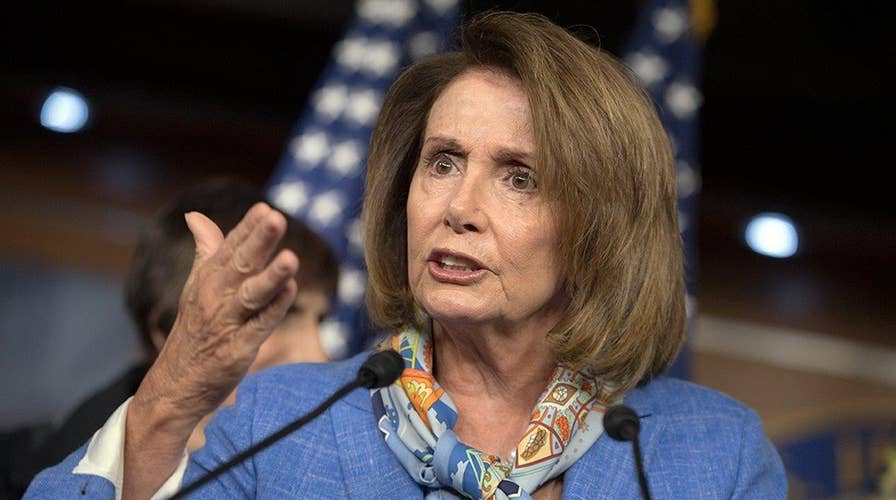Ratner: Media bypasses Pelosi Obamacare inconsistency
Bias Bash: Ellen Ratner on why the media chose to sweep Nancy Pelosi's 'single payer' comments under the rug
The internal wrangling in the parties over who will lead House lawmakers next year shifted dramatically Tuesday to the Democratic side, as party members delayed a vote on whether to keep Nancy Pelosi as minority leader -- while Republicans nominated Paul Ryan for a second term as speaker with little drama.
House Republicans chose to keep Ryan as the leader of the GOP-controlled chamber, after rumbling in recent weeks that his leadership position could be in jeopardy.
However, after Donald Trump upset Democratic rival Hillary Clinton in the White House race last week, and Republicans held onto their majorities in Congress, opposition to Ryan melted away.
Ryan, House GOP Leader Kevin McCarthy, R-Calif.; House GOP Whip Steve Scalise, R-La.; and Chair of the Republican Conference Cathy McMorris Rodgers, R-Wash., all ran unopposed and were unanimously reelected on Tuesday.
Rather, House Democrats are the ones who are restive following their stinging defeats last week, calling into question Pelosi's longtime position as their leader.
Pelosi, a dynamo fundraiser who has been the top House Democrat since 2002, had predicted her party would retake the House but won only a handful of the roughly 30 seats needed.
House Democrats publicly insisted Tuesday that delaying the voting -- from Thursday to Nov. 30 -- is not necessarily a signal of a leadership change.
But they made clear the move was indeed over concerns about the future of their party.
Rep. Brendan Boyle, D-Pa., said they were going to take the extra time to “talk about where we go as a party.”
“We need to decide where we want to fight President-elect Trump and where we want to compromise,” said Boyle, whose home state last week voted for a Republican presidential nominee for the first time since 1988.
Ohio Democratic Rep. Tim Ryan has emerged as a possible Pelosi challenger. He is talking privately with other House members but has not made an official bid.
Ohio Rep. Marcy Kaptur, the longest-serving female House Democrat, said Tuesday that she’s signed a letter in support of Pelosi but that she might reconsider if someone her region would “come into our race.”
“This is a moment for us to listen to American people,” she said.
Congressional Black Caucus Chairman G.K. Butterfield, D-N.C., said the decision to delay came “after considerable discussion” and was a result of his party getting a "shellacking" and the need to "recalibrate."
Butterfield and Boyle each said they intend to vote for Pelosi but made clear that the party has lost touch with its working-class electorate, which feels desperately left behind in the new economy.
Meanwhile, other House Democrats privately made clear the delayed vote was an indication that rank-and-file members are considering a new direction.
“If I were on the side of the road, that’s how I’d look at it,” said a Capitol Hill Democratic source who also argued congressional Republicans consistently raise less money than congressional Democrats but still hold historic House majorities.
The full House vote for speaker is scheduled for January.
The conservative House Freedom Caucus has been a critic of Ryan’s leadership since he took over in fall 2015. The Wisconsin lawmaker’s political future was further called into question when he distanced himself from Trump in late October, after the release of a 2005 audiotape in which Trump is heard making lewd comments regarding women.
However, any effort to oust Ryan appeared damped Sunday when Ryan’s Wisconsin hometown friend and Republican National Committee Chairman Reince Priebus was tapped to be Trump’s White House chief of staff -- and after Rep. Mark Meadows, R-N.C., a leader of the Freedom caucus, said Monday he'd back Ryan for the post.
The last time a House Democrat mounted a serious challenge was after the 2010 wave election when Republican swept the House and then-Rep. Heath Shuler, D-N.C., garnered just 43 votes.
Pelosi and other House Democratic leaders have said that they originally planned to have the vote on Nov. 30 to include all of the incoming freshmen for the new Congress, not just existing members.
“It’s not a delay,” Pelosi said Tuesday as she was trailed by a pack of reporters and photographers.
The postponement push effectively started with two post-election letters to Pelosi from a coalition of 34 House Democrats pressing her to delay the vote.
In a letter last week to the House Democratic Caucus, the California lawmaker resisted attempts for a postponement, writing that other members “have indicated a strong desire to proceed with elections next week in order to prepare forcefully for the lame duck session and the challenges we will face in January.”
However, Pelosi told fellow House members at a meeting Tuesday: “We've been through hell,” and "I don't care when the election is," according to a source in the room.
Fox News’ Chad Pergram and Joseph Weber contributed to this report.





